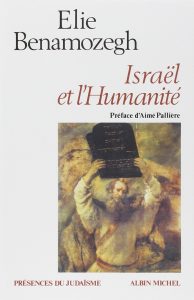 In his seminal book called “Israel and Humanity”, Rabbi Elijah Ben Amozegh teaches that the purpose of Judaism is to bring non-violent morality to the world, not by imposition, but by example.
In his seminal book called “Israel and Humanity”, Rabbi Elijah Ben Amozegh teaches that the purpose of Judaism is to bring non-violent morality to the world, not by imposition, but by example.
The Jewish people has survived, and developed its reflexion as a community, based on this fundamental principle.
Defining oneself as a Jew is for Benamozegh accepting to be part of that mission and narrative.
Being a minority, in the sense of numbers and in the sense of power position, meant for the Sages of Israel like Benamozegh, taking on the task of otherness consciously, with the pressures that this choice includes, even in an environment often hostile to the notion of other.
Being proverbially tagged by negative language, found in religious texts other people believe in, only accentuates the challenge of defining oneself as a Jew.
The plight of African Jews is adding to that oil press, to extract the purest substance of faith and resilience.
Being labeled or seeing oneself as a minority invites a reflexion, on co-creating a social space where these definitions could have a place, without being a cause for confrontation or unfair interactions.
Behind such reflexions stands the question of social evolution.
Jewish religion officially banned death penalty 2000 ago with Rabbi Akiba’s decision.
Yet Jewish people continued to live surrounded by a world where vengeance was officially enforced as just law, under many horrible examples of an immature barbaric world, lagging behind in moral awakening.
Only now, after much suffering, has there started being a level of conversation where Jewish and African people could start contributing to the global moral elevation of the entire planet, at their own possible scale.
Millions of Africans whose history is in the West, are testimony to the difficult path of playing that active moral role of contribution given to them by the tragedy of centuries of slavery, and segregation until the civil rights struggle.
In recent times for the Jewish people it took a frightening toll, counted by the millions of lives, murdered under fascist regimes during the Second World War. It was laid in plain sight for the world to see how far is too far in hating the other, the ones considered strangers, even if they lived in the same country for centuries. And how quickly we can get to that too far.
Millions of people whose religion bans death penalty, were put to death by barbaric bandits, erected as a state power and destructive military force, unleashing its wrath against the weak and the unarmed.
The moral strength of such brutal societies is the weakest that can be.
Anyone that needs to unleash such mass technologies to get rid of babies and poor ghetto people, has become the epitome of weakness and impotence.
And at the same time they have crowned their victims the heroes of the story which will be told again and again about good and evil.
Is the first failure the one that misses the importance and the benefit of enriching oneself through accepting differences?
Can it be that simple, and still fail to be grasped?
The poison of violence consists in the fact that it opposes thinking, at any level that can cool things down.
In the cycles of violence there is no real time to think, just accepting the ping pong level of logic.
But to escape the cycle, it has to be agreed by everyone that violence as a solution is sign of intelligence failure.
Only then can we track violence and hunt it down from our speech, interactions, and solutions to dare look at the questions of humanity and better relating.
Once we understand this, it’s easy to see that there is no such thing as a minority or a majority. It only exists in the subjective gaze of people, whose look at the world needs to be reduced to simplistic proportions of big and small, and who have a hard time going beyond that child level of thinking.
Rabbi Benamozegh was an anti-war humanist who wrote extensively against the horrors of war and believed it was the duty of religions to help humanity heal from that scourge.
He taught that all religions are based on fundamental moral truths, whose purpose it is to elevate human dignity to the level of Tzelem Elokim, the Divine Stamp, as members of a same loving family, respectful of our uniqueness, our contributions and our differences. And always remembering our sameness.
Realizing how much we have in common makes that each one has a unique way to express their love but at the end it’s made for the purpose of being able to articulate love and have it returned multiplied every time. This would be real social evolution, and it is what Judaism humbly but solemnly proposes.
An African proverb says: “The eagle can spot a tiny point from the sky, but he knows how heavy it is.”
